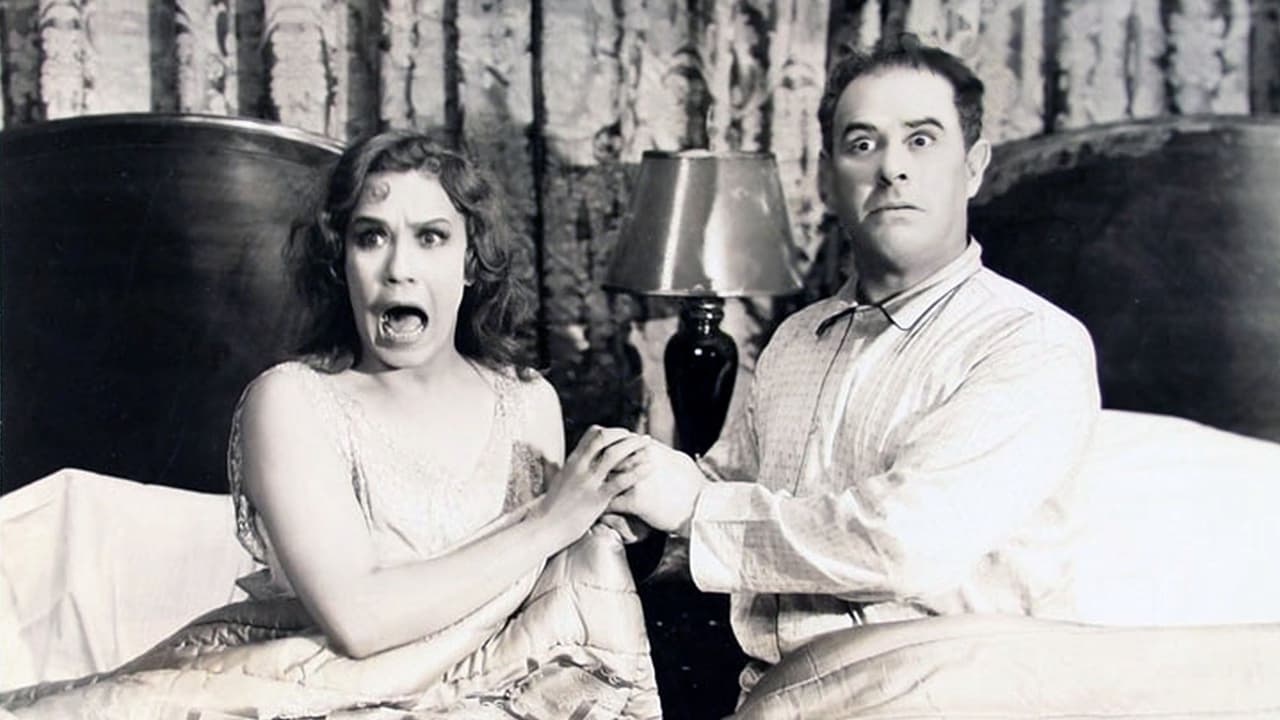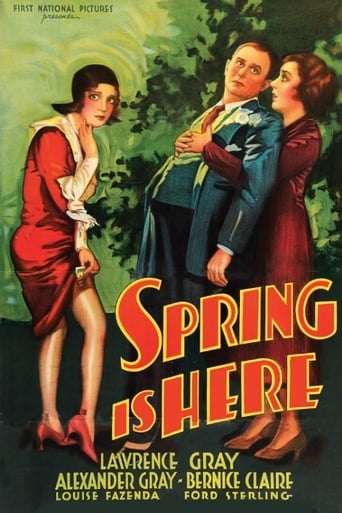Linbeymusol
Wonderful character development!
Borgarkeri
A bit overrated, but still an amazing film
Payno
I think this is a new genre that they're all sort of working their way through it and haven't got all the kinks worked out yet but it's a genre that works for me.
Edwin
The storyline feels a little thin and moth-eaten in parts but this sequel is plenty of fun.
kidboots
"Spring is Here" was a modest (not a flop) Rodgers and Hart Broadway musical of 1929 (109 performances) in which the song "With a Song in My Heart" became a standard but the film version of 1930 didn't even rate a Broadway opening - it had it's "gala" world premiere in Toledo, Ohio!!How could it fail? It starred the gorgeous musical team of Bernice Claire and Alexander Gray who had been such a hit in the recent film musical "No, No, Nanette", another Gray, Lawrence, fresh from "Marianne" and "Sunny" had a pleasant tenor and comics Inez Courtney and Louise Fazenda, plus some very hummable early song hits. But by 1930 cinema patrons were starting to rebel against any film with a misplaced song after a steady diet of dizzy films filled with mediocre music. While this movie had wonderful songs, the plot, in which Owen Davis (author of "Whoopee") adapted from his unsuccessful play "Shotgun Wedding" was just too frivolous for the now sombre tone of the depression.It starts with the blustering Peter Braley (Ford Sterling) berating his fun loving daughter Betty (Claire, wearing a very becoming hair style) for staying out till 5 in the morning with mysterious new boyfriend, Steve Alden (Lawrence Grey). There has already been a snappy musical number with Inez Courtney and Frank Albertson bemoaning the fact that by the time Mary Jane is old enough for parties - they will be extinct!! Frank then informs her to cheer up because "Spring is Here - in Person"!! Light hearted the script may be but they still have time to discuss just how female embryos come into being as well as wondering when a "morning after" pill will come into existence!!When Terry, Betty's long suffering boyfriend comes on the scene, it's obvious why she prefers the lively Steve - Terry (Alexander Gray) is as dumb as they make them!!! Her father forces an engagement and Betty is livid. Steve is "up to date and gives a girl a thrill" according to Betty. Terry thinks, given the chance he could be the same. He tries to convey his thoughts in "Yours Sincerely" with Claire putting her melodious stamp on the song! Mary Jane gives him more sensible advice via the song "Bad Baby" - romance another girl, preferably the vampish Miss Carewe (Natalie Moorehead) to make Betty jealous. He tries it out at the party that night, the Brox Sisters being on hand to sing "Crying for the Carolines". The song proved the big hit of the movie probably because of the superior and more soulful version recorded by Ruth Etting. Before the night is over Betty and Steve have tunefully duetted to "With a Song In My Heart", Betty has posed the question to the stars "How Shall I Tell" and Terry has implored her with the plaintively earnest "Have a Little Faith in Me". For all Lawrence Gray's top billing he goes missing from the last half with the focus definitely on Terry's quest to live life with a kick in it!!Steve returns in the morning with a minister but in a very pre-code scene, Betty greets her father at her bedroom door with a disheveled Terry - could they have spent the night together without the benefit of clergy!! No!! as the minister questions why is he needed to marry this girl when he already performed the service the night before!! Stacy (Albertson) returns and he and Mary Jane perform the liveliest song in the film "What's the Big Idea" complete with an eccentric dance. Inez Courtney reprised her role from the original Broadway production.A very fun movie with the plot just a framework to present some songs - but what songs they were!! And Bernice Claire is so adorably ravishing, you will not be able to keep your eyes off her!!Highly Recommended.
MartinHafer
"Spring is Here" is a very early musical. While musicals were quite popular in the early days of talking pictures, most of them were like "The Gold Diggers of Broadway" and "The Broadway Melody"--stage productions where groups of chorus girls danced about for audiences. The musical style where folks were NOT on stage and just broke into song was a bit later invention. But, "Spring is Here" is a fluke--one of those 1930s films where music was woven into the story---much like the later Jeanette MacDonald films of the mid to late 1930s. However, since it is such an early version of this style musical, it came out before the genre was fully developed. In other words, it's a bit rough and doesn't translate as well to audiences today. The singing is DEFINITELY not the sort that will have you humming along with the singers. Instead, it's very operatic and the voices see odd in a movie--not at all natural and a bit tough on the ear. I am not saying it's bad singing--just odd given the plot. Also odd is that the singers stand so still and they are usually filmed in closeups--most likely because the sound equipment was very primitive and wouldn't allow for more naturalistic shots (much like in early talkies where folks stand in one spot so the microphones will pick up the sound properly).Despite the primitive nature of the film, however, I found "Spring Is Here" to be very watchable--mostly because I liked the parents, Louise Fazenda and Ford Sterling. Both were veterans of Mack Sennett silent comedies and both made nice transitions to sound in this film. In particular, Sterling was a very funny character playing the father of the leading lady. As for the leading lady (Bernice Claire), she is being wooed by two guys--her ex-boyfriend and a handsome new guy. With a little help from her sister and mother, the old boyfriend manages to once again catch her eye. Who will she end up with and how? See this cute little musical comedy. By the way, this being a Pre-Code film, you might be surprised by a few of the more suggestive but funny lyrics and situations in the film. And, get a load of the kiss in the garden--one that long and passionate never would have been allowed in the post 1934 era.
ptb-8
This is seems to me to be a very true adaptation of a Broadway musical of the late 20s, filmed in quite a static way with the characters lined across the screen playing it exactly as if they were also across the stage bellowing lines into each other's faces so the back row could hear it. Given this performance is for a film it seems nobody thought to re direct it for a cinema audience who could hear every word courtesy of fantastic chunky Vitaphone gramophone sound. There is no doubt the dippy parents and flapper daughters play it well to the audience who even might have been expecting a play on film. SPRING IS HERE is quite funny, very stage bound and completely what we expect 80 years later: stodgy comedy, vaudeville mugging wonderful Rogers and Hart music all flattened into the technical aspects of the time. This film is a curiosity piece really, and would irritate your friends who do not understand that it is the restrictions of the medium of the time that makes a film like this attractive to those who love 1920s sound films. Beautiful clothes and sets add to the fun; but do not inflict this film on anyone not familiar with the time tone and tinniness. Maybe play the scenes of just the songs, as they are terrific. No wonder the talkies took off, but you can also see why depression audiences soon tired of songs being yelled at them.
John Esche
This early sound preservation (sort of) of one of Rodgers & Hart's minor Broadway successes (104 performances at the Alvin Theatre at the end of the roaring 20's - March 11-June 8, 1929) was released July 20, 1930, just as the country started its slide into the Great Depression, but bears no actual responsibility therefore.In truth, the film isn't exciting structurally, despite retaining several R&H standards from the stage - the title song, "Yours Sincerely" and "With A Song In My heart". Hollywood at the time was shameless in gutting successful stage properties of the very things which had made them successful in the first place and, in pre-Crash 1929, 100+ performances put SPRING IS HERE in the "hit" column, but it remains a pleasant entertainment and solid reminder of good light 1920's entertainment.Possibly the most interesting aspect of the film however, is the one Broadway cast holdover - Inez Courtney as Mary Jane. Ms. Courtnay repeats a couple of her songs from Broadway and began a decade long career in Hollywood that would culminate as the unforgettable "Ilona' in Lubitsch's LITTLE SHOP AROUND THE CORNER which in turn helped inspire the later Broadway musical SHE LOVES ME.While not a great musical or movie, the remains of Rodgers and Hart's score is a fine one - so fine in fact, that three years later the Vitaphone Corp. would give it (and the show) another outing with a two reel "Broadway Brevities" short called YOURS SINCERELY. Still minor, but still very entertaining.Worth seeking out. Not a lost treasure perhaps, but very nice costume jewelery.

